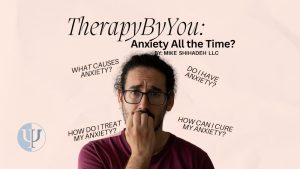Key Takeaways
- Mental Health Awareness Month happens every May to encourage open conversations and reduce stigma.
- Common mental health conditions like anxiety and depression are treatable and affect millions.
- The 5 C's—Connection, Compassion, Coping, Community, and Care—offer simple ways to support well-being.
- Mental health awareness continues beyond May, with October also hosting international observances.
- You're not alone—help is available, and healing is possible.
Mental Health Matters to Everyone
Have you ever kept your struggles hidden, afraid no one would understand? You’re not alone—many people feel exactly this way. That’s why we celebrate Mental Health Awareness Month every May. It’s a chance to talk openly, learn from each other, and show compassion. The point is that Mental health isn’t about being perfect—it’s about being human (American Psychological Association, 2023).
Start Your Healing Journey
What Is Mental Health Awareness Month? – History and Origins
Imagine springtime, when flowers bloom and the world seems to come back to life. Similarly, Mental Health Awareness Month—celebrated every May since 1949—reminds us that renewal and growth are possible, even when things feel incredibly heavy. For many in a mental health crisis, it can feel like being underwater in a dark pool—unable to see the surface or believe a brighter day is ahead. It can feel like winter dragging on forever. But even the longest winters DO thaw. And just like nature, we are built for seasons—Spring always returns. It was started by Mental Health America (MHA) to encourage conversations and support around mental health, helping everyone understand it’s okay to ask for help (Mental Health America, 2024).
Imagine This: In a small town, a teacher named Carla put up a bulletin board in May with facts and statistics about mental health, like…
- Nearly 1 in 5 American adults will experience a mental health condition in any given year.
- 46% of Americans will meet the criteria for a diagnosable condition at some point in their lives,
- Half of those will begin before age 14 (Mental Health America, 2024).
She included resources for students as well. That simple act sparked conversations among kids—conversations that might have been the first time they felt seen or realized they weren’t alone in their struggles. For many, it may have been the moment they stopped believing they were the only ones hurting. By learning why awareness helps, we can better understand its importance.
Mental Health Facts
59.8%
28%
350:1
Why Mental Health Awareness Month Is So Important
Talking about mental health can change lives—Anxiety and Depression are treatable, not curable, because they’re a natural human experience (but that’s for another topic), but, all treatments require acknowledgment and open dialogue otherwise, these feelings build up and grow larger and larger.
- Break the Silence: Open conversations reduce stigma, making it easier to talk openly without feeling ashamed.
- Reach Out, Not Alone: When we talk about mental health, more people feel comfortable seeking support.
- Together is Better: Sharing stories and experiences helps people connect.
- Advocacy Matters: Awareness inspires better policies, resources, and access to care (National Alliance on Mental Illness, 2023).
Every time we speak up about mental health, we make it easier for someone else to do the same. Let’s explore the conditions most people face but often hesitate to name.
The Most Common Mental Health Conditions – Understanding Anxiety and Depression
Have you ever felt your heart race before a big test or meeting? That might be anxiety—and it’s very common. Anxiety makes you feel worried or afraid about what MAY happen even when things are okay. Our brains are FANTASTIC storytellers, and Anxiety is a mastermind about suspense stories. Depression can feel like a cloud of sadness, making everything feel harder and less enjoyable, even things you used to love, feeling stuck and held to the past and regrets of what had happened.

These feelings happen to many of us, and there’s nothing wrong with you for feeling this way; in fact, it’s fairly normal to experience both of these. The concern is when they grow too much and become a detriment, stopping you from living life or moving forward with what you deserve to experience. Both anxiety and depression can get better with help (Anxiety & Depression Association of America, 2022).
Imagine This: A student named Jalen stopped enjoying basketball and started skipping school. During Mental Health Awareness Month, his school counselor, instead of punishing or giving detention, gave a talk that helped him recognize he was showing signs of depression. Jalen reached out to his parents, and they started getting him help based on grace and su
Take the Next Step Toward Healing
How to Participate in Mental Health Awareness Month – Simple, Powerful Actions

Personal
Actions
- Keep a journal of your feelings—it helps clarify your thoughts.
- Take short mindfulness breaks—five deep breaths can make a difference (Mindful.org, 2023).

Community
Involvement
- Join a local mental health walk or workshop to show your support.
- Volunteer or support a mental health charity near you.

Online
Involvement
- Share positive mental health messages on social media.
- Use hashtags like #MentalHealthAwareness and #EndTheStigma to spread awareness.
You don’t need a big platform to make a big difference. A single conversation or post can change someone’s life. Even everyday habits can become rituals of healing. Let’s explore the daily tools that help.
The 5 C's of Mental Health – Daily Tools for Mental Wellness
- Connection: Call a friend, have coffee with someone, or send a thoughtful message.
- Compassion: Be gentle with yourself when you’re struggling—and offer grace to others.
- Coping: Handle stress in healthy ways—take a walk, draw, breathe, or talk it out.
- Community: Join a group, support local mental health events, or start a conversation.
- Care: Prioritize rest, eat well, stay active, and see a therapist if you need one (Mental Health Foundation, 2022).
The 5 C’s remind us that mental wellness doesn’t need to be complex. Small, caring actions matter. You might wonder—if mental health is so important, why do we talk about it in both May and October?
May vs. October – Understanding Different Mental Health Observances
- May: Mental Health Awareness Month (USA) – a full month dedicated to broad mental health education and support.
- October 10: World Mental Health Day – a global event to inspire international awareness and action (World Health Organization, 2023).
Whether it’s May or October, what matters most is that we keep showing up for each other all year long. So, what can we take with us after this month ends?
Final Thoughts – Every Month Is Mental Health Month
- Mental health matters every day—not just in May. Checking in with ourselves, offering support to others, and reaching out when needed can make all the difference. You don’t have to wait for a special day to start caring for your mental health. Start today, and keep going.
Frequently Asked Questions about Constant Anxiety
Every May in the United States.
It helps reduce stigma, educate the public, and encourage people to seek help.
Attend events, share stories online, donate, or just check in on someone you care about.
No. Mental health affects everyone—it's about well-being for all.
Absolutely! Schools often hold events, and even simple acts like journaling or talking to a trusted adult count.
You matter, and Help is Here
Works Cited
- American Psychological Association. (2023). Talking about mental health matters. https://www.apa.org
- Anxiety & Depression Association of America. (2022). Understanding the facts. https://adaa.org
- Mental Health America. (2024). Mental Health Awareness Month. https://mhanational.org
- Mental Health Foundation. (2022). Five ways to wellbeing. https://mentalhealth.org.uk
- Mindful.org. (2023). How to practice mindfulness. https://www.mindful.org
- National Alliance on Mental Illness. (2023). Mental health statistics. https://nami.org
- World Health Organization. (2023). World Mental Health Day. https://www.who.int





